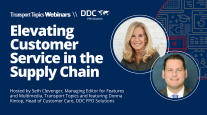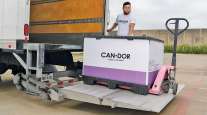Staff Reporter
Public, Private Groups Pilot Last-Mile Delivery Hub in Seattle

[Stay on top of transportation news: Get TTNews in your inbox.]
In collaboration with various companies, the University of Washington’s Urban Freight Lab is piloting a zero-emission hub for last-mile deliveries.
The pilot, called the Seattle Neighborhood Delivery Hub, allows participating companies to test vehicles, delivery models and technologies in an effort to get new eco-friendly solutions to market more quickly. The Urban Freight Lab is housed within the Supply Chain Transportation and Logistics Center at the University of Washington.
The project, which includes the support of the Seattle Department of Transportation, brings together companies such as AxleHire, Coaster Cycles, BrightDrop and REEF, each of which specializes in connectivity solutions.

Goodchild
The pilot, slated to run through midsummer, is taking place in Seattle’s Uptown neighborhood. Located between Elliott Bay and Lake Union, Uptown is home to the Space Needle. Anne Goodchild, founding director of the Supply Chain Transportation and Logistics Center, noted the area is highly constrained due to “hills and water all around.”
“We really do have multiple goals that we are monitoring with the hub,” Goodchild told Transport Topics. “Reducing emissions is very much one of them, but so is trying to match the vehicle with the environment. Shopping has evolved a lot, and warehouse strategies are shifting. I think that many neighborhoods would like to reduce the number of heavy vehicles circulating on their streets and move toward something that’s a little more compatible with pedestrian activity or the time of day that pedestrians are out.”
A new project at @UW is targeting the "last mile" of parcel delivery — testing strategies to achieve zero emissions in the final stage of delivery.@SCTLCenter https://t.co/FcBg9DkTqx — UW News (@uwnews) June 21, 2021
Specifically, the delivery hub houses a cargo cyclist delivery service, a neighborhood kitchen and a common carrier parcel locker, which serves as a delivery option for all major package carriers and enables neighbors to complete their own final-miles. Operated by technology and logistics company REEF, the kitchen will prepare online food orders for delivery, reducing costs for restaurateurs and offering faster delivery options for customers.
The delivery service will involve Coaster Cycles’ Electric Cargo Trikes, which are designed to offer a quieter and more sustainable alternative than diesel-powered trucks. These trikes will be freighted with BrightDrop’s electric pallets, which are designed to reduce touch points. BrightDrop is a business unit of General Motors Co.
The hub and its associated modes of transportation are equipped with sensors provided by the University of Washington’s Smart Transportation Applications and Research Lab. These sensors will provide data regarding activity, which the Urban Freight Lab will analyze to assess energy reductions and provide feedback to the participants.

Call
Washington Trucking Associations Executive Vice President Sheri Call said this pilot program aligns with Washington’s statewide considerations of environmental impacts and walkable cities.
Goodchild described Uptown as “mixed-use” with a significant need for freight delivery, noting its combination of residential density and commercial activity creates competition for curb space. She noted some residents are happy with current delivery methods, but others have expressed frustration with lost packages and uncertainty over how delivery drivers will access their buildings, which can be a challenge for multi-unit dwellings.
“I think the world of convenient and efficient logistics is going to have different alternatives for people with different habits,” Goodchild said. “This is one that we think provides benefits to many parties. If it’s attractive to you, great, but we’re not implying that this has to be the way that everybody gets their packages.”
The project supports the city’s Clean Transportation Electrification Blueprint by incorporating zero-emission technology in delivery services. The blueprint established a goal of 30% of goods delivery to be zero-emission by 2030.
“Over 60% of Seattle’s greenhouse gas emissions comes from transportation," Seattle Department of Transportation Director Sam Zimbabwe said, “so we must change how we move around in order to meet our commitment to become carbon neutral by 2050.”
Want more news? Listen to today's daily briefing below or go here for more info:




